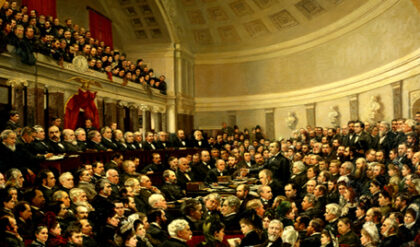Electoral Count Act of 2022
ECA Protect Democracy Information
Electoral Count Act of 2022
[Office of Sen. Susan Collins]
ECRA would reform and modernize the outdated 1887 Electoral Count Act to ensure that electoral votes tallied by Congress accurately reflect each state’s public vote for President. It would replace ambiguous provisions of the 19th-century law with clear procedures that maintain appropriate state and federal roles in selecting the President and Vice President of the United States as set forth in the U.S. Constitution.
KEY PROVISIONS INCLUDE:
- Single, Conclusive Slate of Electors. Includes several important reforms aimed at ensuring that Congress can identify a single, conclusive slate of electors from each state:
-
- Identifies Official to Submit Slate. Identifies each state’s Governor, unless otherwise specified in the laws or constitution of a state in effect on Election Day, as responsible for submitting the certificate of ascertainment identifying that state’s electors. Congress could not accept a slate submitted by a different official. This reform would address the potential for multiple state officials to send Congress competing slates.
- Provides for Expedited Judicial Review. Provides for expedited review, including a three-judge panel with a direct appeal to the Supreme Court of certain claims related to a state’s certificate identifying its electors. This accelerated process is available only for aggrieved presidential candidates and allows for challenges made under existing federal law and the U.S. Constitution to be resolved more quickly.
- Modernizes Rules for Counting Electoral Votes. Requires Congress to defer to slates of electors submitted by a state’s executive pursuant to the judgments of state or federal courts.
- Role of the Vice President. Affirmatively states that the Vice President’s constitutional role, as the presiding officer of the joint meeting of Congress, is solely ministerial and that he or she does not have any power to determine, accept, reject, or otherwise adjudicate disputes over electors.
- Higher Objection Threshold. Raises the threshold to lodge an objection to electors to at least one-fifth of the duly chosen and sworn members of both the House of Representatives and the Senate. This change would reduce the likelihood of frivolous objections by ensuring that objections are broadly supported. Currently, only a single member of both chambers is needed to object to an elector or slate of electors.
- Protection of Each State’s Popular Vote. Strikes a provision of an archaic 1845 law that state legislatures could use to override the popular vote in their states by declaring a “failed election” – a term that is not defined in the law. Instead, this legislation specifies that a state could move its presidential election day, which otherwise would remain the Tuesday immediately following the first Monday in November every four years, only if necessitated by “extraordinary and catastrophic” events.


